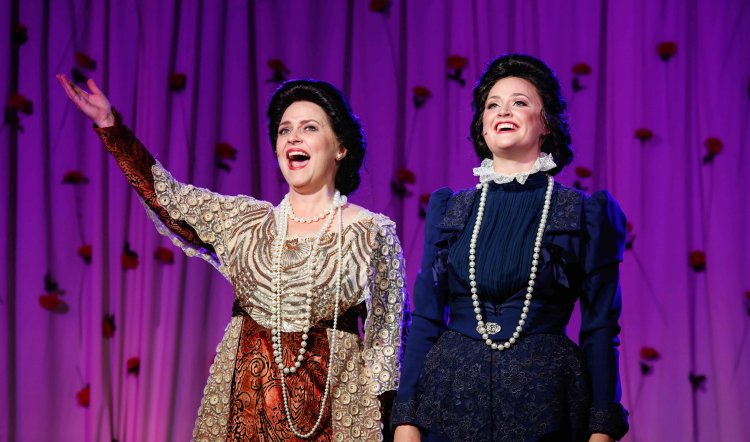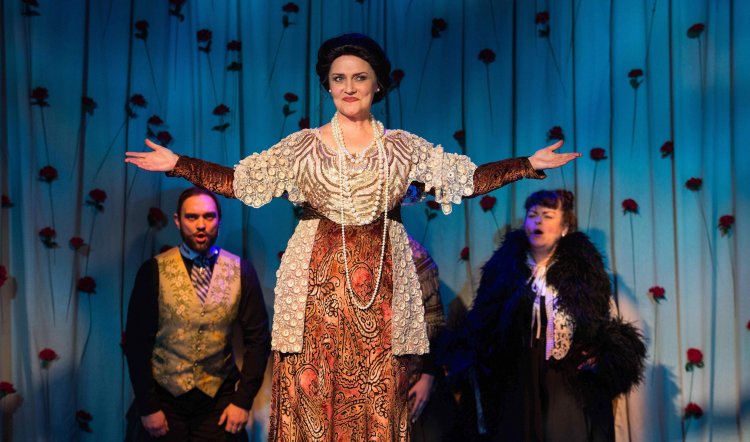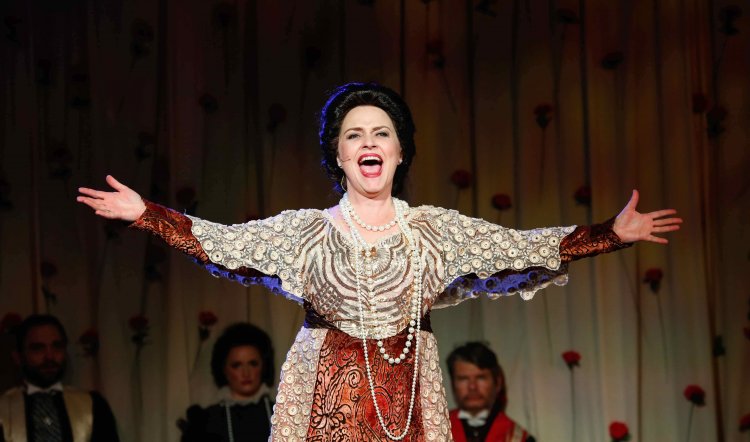
MELBA
MELBA, Hayes Theatre Co & New Musicals Australia at the Hayes Theatre, 13 August- 9 September 2017. Photography by Clare Hawley; above - Emma Matthews and Annie Aitken; below - Blake Erickson, Emma Matthews and Genevieve Lemon; below again - Emma Matthews
Let’s start by saying Melba is an experience not to be missed – pure and simple. It’s that rare thing: a new Australian musical about an Australian; and because that Australian was the first megastar soprano the world had ever seen, there is sublime and familiar music to be heard. And because the megastar was Nellie Melba, there’s even a good story to enjoy.
Melba has been in musical utero for eight years so it arrives on stage at the Hayes in pretty good shape. The book and lyrics by Nicholas Christo take as a focus – around which everything else revolves – Melba’s triumphant return to Australia in 1902 and one of her many Melbourne concerts.
Offstage, in silhouette, the diva warms up with a few hummed bars of “No Place Like Home”. (It’s unmistakably Emma Matthews and there’s a tangible shiver in the audience.) And from that point the irony of the plaintive song’s sentiments play out as the narrative circles back to Nellie’s youth. The late Victorian era – she was born in 1861 – was no place for an ambitious, independent young woman, particularly one whose overwhelming passion was to sing – and to go to Europe to learn.
Her gruff Scottish father (Michael Beckley) is finally persuaded and also helps his daughter in strong-arming her badly-chosen but charismatic husband Charlie Armstrong (Andrew Cutcliffe) to allow her to go. This young and ambitious Nellie is played by musical theatre up-and-comer Annie Aitken and she and Emma Matthews make a remarkable onstage pairing, one watching the other, silently reacting and adding an extra emotional facet to the diva, and then occasionally they sing together and it’s a little bit of magic.
At the age of 25, Mrs Armstrong arrives in London with her young son and is greeted with indifference and predictable snobbery (she is a colonial, after all), so she goes to Paris and bangs on the door of the singing teacher of the day, Madam Marchesi (Genevieve Lemon). This fabled dragon is no more impressed by the pushy, badly dressed Australienne than Sir Arthur Sullivan had been in London and her snotty daughter Blanche (Caitlin Berry) is even ruder; until Nellie opens her mouth.
As well as original music by Johannes Luebbers, the show is punctuated by some of Melba’s most famous arias and when Matthews launches in to one such, the pole-axed Marchesi gasps, “J'ai enfin une étoile!” – “I have a star at last!” Blanche swoons too, as does the audience for, of course, this is the real thing and sweet serendipity, young Emma (Lysons) trained in the Marchesi method!

Under Madam’s tutelage Nellie is at the Paris Opera within a year and no longer Mrs Armstrong but the inspiration for Peche Melba and Melba toast, among other taste sensations. She is befriended by socialite Gladys de Grey (also Caitlin Berry) whose mission in life is to spend her husband Frederick’s (Blake Erickson) money; between them they storm Covent Garden. Nellie is at last enjoying the fruits of her extraordinary talent and one of the juiciest is Phillipe, Duc d’Orleans (Adam Rennie). Europe and the Duc are at her feet.
It wasn’t all roses, however, no matter how much Nellie loved them and how many were joyously hurled at her. Charlie Armstrong demands she return to Australia and her wifely duties and he plans to make their son George (a large puppet manipulated and voiced by Samuel Skuthorp) the lever to force her compliance.
The musical’s book and story arc is based on Ann Blainey’s acclaimed biography Marvellous Melba, so to a greater degree, what we see is what she got – and it will be familiar to women of all ages. Although Charlie is a violent drunk who has been supported by his wife’s earnings, it is Nellie who is the scandalous figure – reviled in the popular press. And she discovers before long that not only can she not have it all (motherhood and a career) but it can be taken away from her too. When Charlie finally kidnaps George and disappears with him to the USA, Nellie’s (Matthews) rendition of “Vissi d’arte" from Tosca is heart-breaking.
Nevertheless, the show is centred around the triumphs of 1902 and under Wayne Harrison’s direction and musical director Michael Tyack, the action is more celebratory than sad – a first act highlight and beautifully integrated music and story moment is a party scene where young Nellie dances with her Duc to the diva Nellie’s rapturous delivery of “Sempre libera" (from La Traviata). There is a lot of witty dialogue and ingenious folding and unfolding of old and new elements – both music and text.
The company is as strong as it needs to be to sing beside one of the greatest sopranos Australia has ever produced and their performances are dazzling. In particular, Caitlin Berry is hilarious as snooty Blanche and outrageous Gladys (she pronounces it “Glay-diss” because Gladys is, well, boring and infra dig.) Adam Rennie is heartthrob material vocally and – um – otherwise, while at the wicked end of the “yum-o-meter”, Andrew Cutcliffe is a dangerously appealing singer-actor.
The rarely less than wonderful Genevieve Lemon is a perfect Madam Marchesi and a couple of other old boots, while Michael Beckley and Blake Erickson also double roles and are the heavyweight vocal and histrionic presences that give the ensemble heft.

As young George, Samuel Skuthorp starts out sounding like a boy soprano before gradually morphing into a sweet light tenor and is a convincing loving, sad son. Unfortunately he’s hampered by one of the most puzzling puppets ever. The two are dressed in similar Victorian-style sailor suits, but the puppet’s silvery-metallic face resembles an ugly and nasty old man. It’s a jarring visual in an otherwise sumptuous and realistically costumed production, where natty waistcoats abound and there are enough baroque pearls to make an oyster's eyes water (designer Mark Thompson).
The set, too, is a curiosity: a semi-circular white draped backdrop dotted with red roses. It opens on either side to reveal a diva-ish dressing room and is also illuminated occasionally to throw silhouettes. In front of it is a circular, raked and raised stagelet on which is projected significant information – La Scala, the Met, Covent Garden, Paris Opera – and the central motif of Melba’s 1902 tour of Australia. The Hayes performance area is not the biggest and these devices cramp it even more, as well as forcing performers in long and billowing skirts to make perilous transits up and down steps.
Lighting designer Trudy Dalgleish makes the most of the director’s placement of actors, however, and adds a rich element to the action. Sound designer Caitlin Porter also does fine work in gentle and well modulated mic-ing of the performers and their hidden band. Technically it’s a terrific production. Luebbers' modern music too is far from shabby, if not inspired. It’s stylistically intelligent, with echoes of music hall and operetta as well as modernist touches (for young George) and it works surprisingly well alongside the great arias (Mozart, Verdi, Donizetti, Bizet, Rossini, Puccini and Gounod – no pressure).
The two halves – it runs two hours 40 with an interval – are still somewhat uneven and the end is abruptly jolly after a sequence of teary tragedy, but this is a remarkable achievement and not to be missed. All in all, Melba is a peach of a show – sorry, couldn’t resist – and it’s not only the intimate presence of the real-deal diva Emma Matthews, but also a first rate singing-acting company that lifts the production to often dizzy heights. An amazing opportunity for opera and musical theatre devotees alike. Totally recommended.



